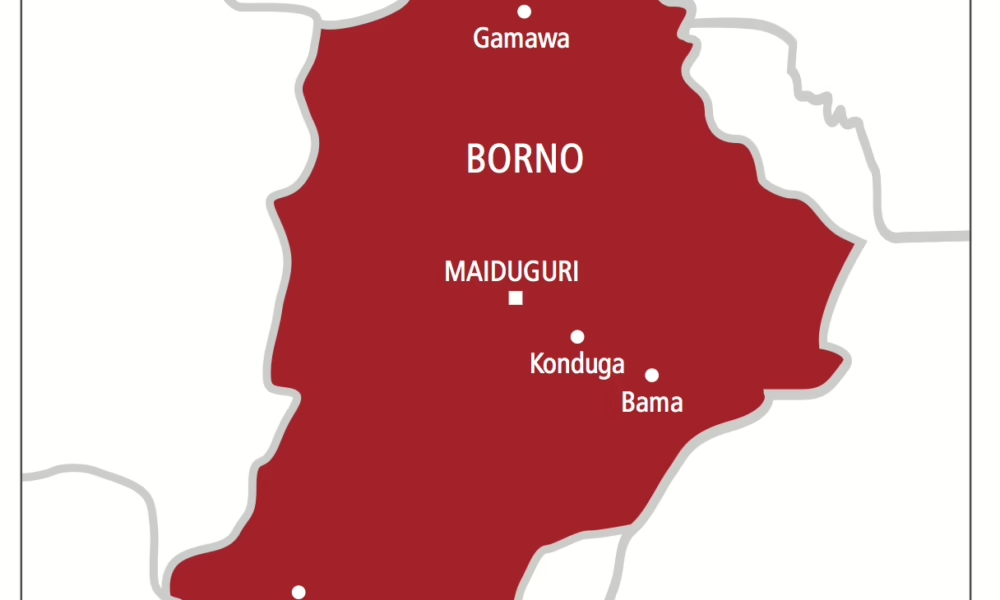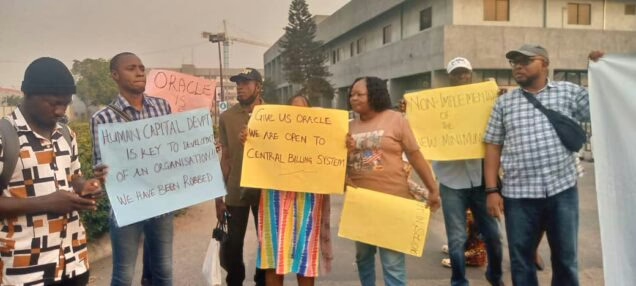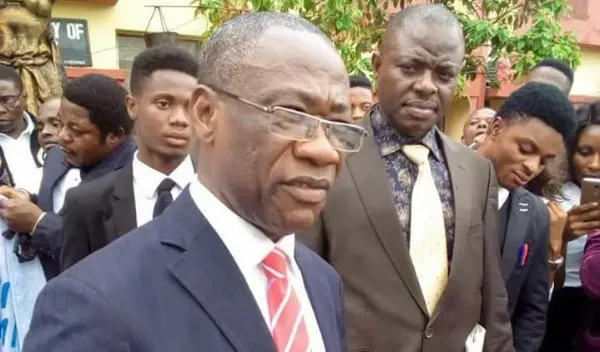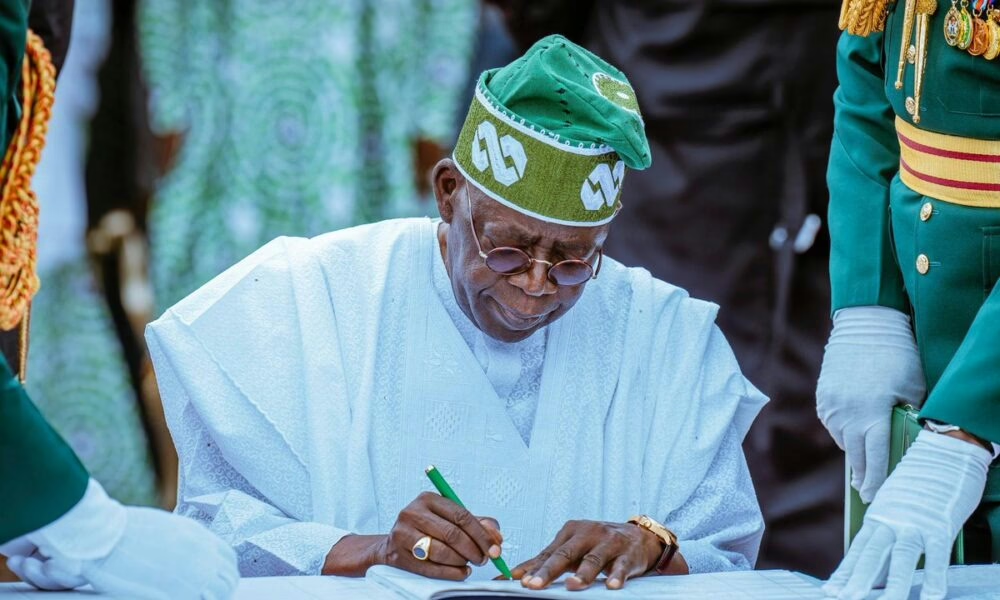All is now set for the inauguration of the President-elect, Asiwaju Bola Tinubu, on Monday as the Supreme Court on Friday dismissed the suit by the Peoples Democratic Party seeking the disqualification of the ticket that produced the president-elect, Bola Tinubu and the vice-president-elect, Kashim Shettima, in the 2023 presidential election.
Similarly, a Federal High Court in Abuja declined to issue an order of interim injunction to stop Tinubu’s inauguration, as the plaintiffs alleged that the President-elect lied on oath in the form he submitted to INEC.
Meanwhile, the apex court affirmed that Tinubu and Shettima were eligible to contest the presidential election held on February 25.
In an appeal marked SC/CV/501/2023, the PDP sought Tinubu’s disqualification on grounds of double nomination of his then running mate, Shettima.
The party claimed that Shettima was nominated twice, both for the Borno Central Senatorial seat and for the vice-presidential position.
PDP argued that Shettima’s dual nomination was in gross breach of the provisions of Sections 29(1), 33, 35 and 84(1) and (2) of the Electoral Act, 2022. The party therefore prayed the court to nullify Tinubu and Shettima’s candidacy.
It also applied for an order to compel the Independent National Electoral Commission to remove their names from the list of nominated or sponsored candidates that were eligible to contest the presidential poll.
Opposing the position by the plaintiff, Lateef Fagbemi (SAN) contended that the PDP ought to have remained an onlooker no matter its grievance in how the APC nominated its candidates.
“It is abundantly clear that the appellant in the totality of its position in the instant case is peeping and ‘poke nosing’ into the affairs of another party as a busy body and meddlesome interloper,” he said.
In a unanimous decision of a five-man panel, the court held that an appeal by the PDP challenging the validity of the Tinubu/Shettima ticket lacked merit.
Delivering the lead judgment on the suit, Justice Adamu Jauro upheld the concurrent decisions of the Court of Appeal and the Federal High Court in Abuja, which earlier dismissed the case.
The court ruled that the plaintiff lacked the legal right to meddle in the affairs of the APC which nominated them as its candidates in the election and dismissed it.
Describing the appeal as an activity of “a nosy busybody and a meddlesome interloper, the court stressed that the law did not permit a political party to dabble in the domestic affairs of another party.
The court agreed with the respondents that section 285 (14) (c ) of the 1999 Constitution, as amended, and section 149 of the Electoral Act, 2022, did not confer to them the legal right to question the candidature of Shettima on the grounds of double nomination.
The apex court held that section 84 of the Electoral Act only empowers an aspirant that participated in the primary election of a political party to challenge the nomination of a candidate by the party.
The court maintained that the PDP did not prove that its rights were threatened, adding that the party failed to establish the injury it suffered as a result of the nomination by the APC.
The apex court also reprimanded the PDP for filing the appeal which it said was frivolous.
It held that evidence before it showed that Shettima duly withdrew as the candidate of the APC in the Borno senatorial election on July 6, 2022.
Justice Jauro said, “From the trial court down to this court, it has been a waste of precious judicial time.”
He admonished counsel to advise their clients “against filing this sort of suit in the future.”
It further awarded in favour of the respondents the sum of N2m damages against the PDP.
Meanwhile, the presidential candidate of the Peoples Democratic Party in the February 25 election, Atiku Abubakar, said the dismissal of the appeal was not a setback in the party’s quest for justice in the election petition tribunal.
Atiku reiterated the resolve of his legal team to prove that the election of Tinubu and Shettima was fraudulent and a violation of the nation’s constitutional requirements.
In a statement he signed, Atiku said, “The Supreme Court’s dismissal of the case of the PDP is not a setback to my quest for justice. Our legal team is primed to robustly prove that the election of February 25 was fraudulent, did not comply with the constitutional requirements and the electoral guidelines of the Independent National Electoral Commission and that the announced winner was not even qualified to contest the poll.
“The battle for democracy and the enthronement of a new order to spur growth and development in Nigeria is one to which I have committed my all and for which I am not ready to walk away at this point when our nation is at crossroads. We know that sooner than later, our esteemed Justices will make the pronouncement that will serve as a befitting requiem for mandate bandits.
“I urge my supporters to exercise patience and conduct themselves peaceably as we diligently conduct our litigation at the Presidential Election Tribunal Court.”
Meanwhile, the PDP through its National Publicity Secretary, Debo Ologunagba promised to issue a formal statement, noting that the party was yet to read the judgment. “We cannot make a comment now because we have not even read the judgment. When we do, we will make our position known,” Ologunagba said.
– Ifoh
Speaking on the readiness of the Labour Party to proceed with its petition at the tribunal, the party’s acting National Publicity Secretary, Mr Obiorah Ifoh, said the party was not interested in the outcome of the Supreme Court judgement concerning Shettima.
Rather, he said the party and its presidential candidate, Peter Obi, “are looking at the election process and we are sure of victory at the tribunal.”
Ifoh added, “Our case in the court is different from the one the PDP lost at the Supreme Court today (Friday). We are hoping and sure that the outcome will not affect our case. We pray to get justice. We are looking at the election process. So, what happened today is inconsequential to our case.”
Meanwhile, the Chief spokesperson for the Obi-Datti Presidential Campaign Council, Yunusa Tanko, has expressed disappointment over the judgment, saying Nigeria’s judiciary has stopped being the last hope of the masses.
He added, “I am saddened at the development. My problem with it is this; the more we look up to the judiciary to help our democracy out of the quagmire, the more it puts us into a more difficult situation. It is very painful that if the judiciary cannot do the right thing for the benefit of our democracy, we all know the danger.”
Reacting to the Supreme Court judgment, the spokesman for the dissolved APC Presidential Campaign Council, Festus Keyamo (SAN), noted that every serious lawyer knew from the outset Atiku and his party had no case.
Keyamo hinged his argument based on a settled principle of law that stipulates that a party cannot meddle in the internal affairs of another political party.
He also explained that it was on record Shettima notified his party about his withdrawal from the senate race before his nomination as vice presidential candidate.
He stated, “There was no case at all in the first place. It was all a storm in a teacup. Core legal practitioners, not the social media ones, always knew that there was no case there at all. It was an issue that bothered on settled principles of law that stipulated that you cannot poke your nose into the internal affairs of another political party. It is a settled principle.
“So, where they are getting their confidence from, I don’t know. If you look at the judgment, apart from the issue of locus standi, one of the judges has actually held that on the fact of the case, Shettima did not even put in for double nomination at all. This is because he has sent his withdrawal notification to the party before his nomination as the vice-presidential candidate, thereby making part of their (PDP) case at the lower court to collapse.”
He added that the APC would wait for the petitions at the tribunal to run their full course.
In a related development, the Federal High Court, Abuja has declined to issue an order of interim injunction to stop the swearing-in of the president-elect, Bola Tinubu of the All Progressives Congress, as President of Nigeria, on May 29.
In the suit marked FHC/ABJ/C5/657/2023, three plaintiffs – Praise Isaiah, Paul Audu and Anongu Moses – alleged that Tinubu lied on oath in the Form EC9 he submitted to INEC in support of his qualifications to contest the election.
They also told the court that findings revealed that “the Tinubu” who attended Chicago University in the United States of America, was a female.
Furthermore, the plaintiffs who identified as “concerned citizens” alleged that it was discovered that the President-elect was born in 1957 against the year 1952 which he presented as his actual date of birth.
Among other prayers, they urged the court to order the arrest and detention of Tinubu.
They also asked the court to halt his inauguration as president pending the determination of cases against him at the Presidential Election Petitions Court.
Arguing that Tinubu’s action was in gross violation of Section 117 of the Criminal Code Act as well as Section 156 of the Penal Code Act, the litigants further prayed the court to forbid Tinubu from vying for any elective position for the next 10 years.
Meanwhile, the court in a ruling delivered by Justice James Omotoso held that it lacked the jurisdiction to entertain the case and grant the prayers.
The court held that the suit was “unconstitutional, frivolous and vexatious.”
It said the plaintiffs lacked the legal right to institute the case while stressing that under section 285 (14) of the 1999 Constitution (as amended), only an aspirant could challenge the qualification or nomination of a candidate in an election.
It maintained further that since the election had already been concluded, only the Court of Appeal has the jurisdiction to entertain cases arising from the presidential election.
He stated that the plaintiffs wasted the time of the court by filing the suit and described the action as an abuse of court process, aimed at exposing the judiciary to ridicule.
It held that the suit seeking to stop the inauguration scheduled to take place in a few days was capable of destabilising the democracy in the country adding that the court would not lend itself to be used as an instrument for such an outcome.
He threatened to refer counsels that facilitated the suit to the Legal Practitioners Disciplinary Committee for instituting an action “capable of dragging the judiciary into the mud.”
The judge thereafter dismissed the suit and awarded a cost in favour of the respondents.











